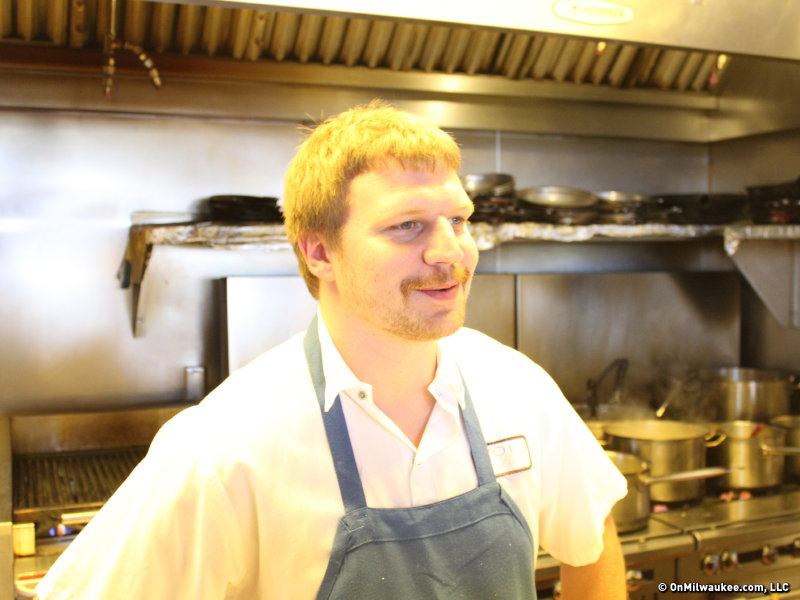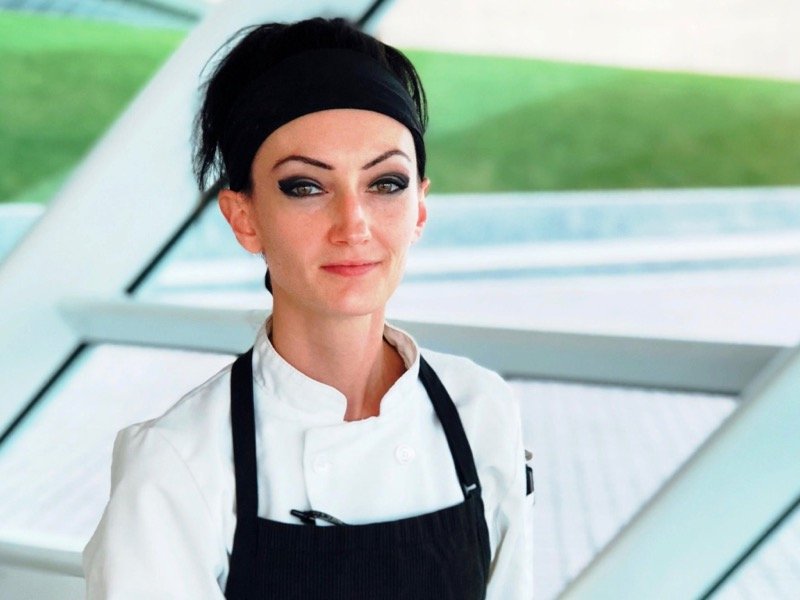A restaurant is lucky when it has a guy like Cole Ersel who spends his days breaking down whole animals and making charcuterie. Just ask Executive Chef Dan Jacobs of Wolf Peach:
"Cole is absolutely indispensable," Jacobs explains. "Every week, we get a pig in to butcher for our sausages and chacuterie. Without him doing that – and doing it well – we could not achieve a good percentage of our menu."
Ersel is a young, energetic sort with a sly smile and a zest for life. He grew up in Watertown, WI and started cooking when he was 19 years old. He got a job at Reva on Navy Pier for the summer, which solidified his decision to attend culinary school at the Art Institute in Colorado.
The day after graduating from their two year program, Ersel packed up his truck and moved back to Milwaukee. Within the week, he had a job as the fish sauté cook at Carnivore, where he also broke his teeth breaking down heirloom hogs.
Ersel continued on to become a grill and sauté cook at Hinterland. And that’s when he says he really got into "hogging and sausaging."
"I spent a lot of time watching and talking with Paul Funk," he tells me. "I didn’t get a chance to really get my hands dirty, but I learned a lot watching."
In April 2012, Ersel moved over to Roots, where he started as a line cook.
"I suggested that we start breaking down hogs," Ersel recalls. "So, the a.m. sous chef and I would do all the hog butchering. It was fun. We did charcuterie, brunch ingredients like Canadian sausage and bangers."
When Roots closed, Dan Jacobs brought Ersel on as sous chef at Wolf Peach, a role that requires him to keep the entire kitchen running smoothly, in addition to ensuring that the kitchen has a steady supply of pork, beef, lamb, chicken and fish ready to go.
I wanted to hear more about the type of work Ersel does day-in and day-out, so we sat down for a chat on a sunny spring afternoon to talk about what it’s like to be a sous chef at Wolf Peach.
OnMilwaukee.com: What made you choose food as your career?
Cole Ersel: I wasn’t a person who ate at nice restaurants or who was really exposed to a lot of different foods. My mom did cook, and I always peeled potatoes for her. But, I always worked while I was growing up.
I did one year at UWM. All I could envision was that I was going to end up at a desk somewhere doing something really boring. But, cooking was hands-on.
OMC: What do you wish you had known when you took your first sous chef position?
CE: I hadn’t really built up a base in charcuterie, so that was a lot of work going in. It’s also really difficult to get things done during the day. I didn’t realize how much time it takes to manage people. This is one of the largest kitchen staffs I’ve worked with. It’s a lot to manage.
OMC: What’s the most challenging part of your job?
CE: I would say walking away … walking away and being confident that everything is OK. After I go home at night, even then I go over what happened. I’m always trying to anticipate what Dan is going to ask me about, what I need to take care of. It’s hard to walk away and trust that everyone is doing what they’re supposed to be doing. The pressure of being responsible. That’s the hardest part.
OMC: What’s the best part?
CE: Everything. I really like it. Here, my job is much more than managing people. I do charcuterie, and I get to own that. Mustard, pickles, butchery, and charcuterie – that’s my world here. Fish, chicken, pork, beef, and lamb – it’s all mine.
I make beef jerky and pickles for Bloody Marys ... bacon, guanciale, chorizo, bangers, soyrizo. It’s really nice to have my stuff.
The only drawback is that, having such a big workload, I don’t get to work the line much anymore. I’m more of an extra. I help people out more than anything.
OMC: What have you learned most about yourself while working in the kitchen?
CE: I’ve learned that I’m definitely cut out for this work. It’s not the corporate world. It’s informal. You can joke and swear, and it’s just an awesome place. Happy cooks are cool people, so if you have happy guys, everyone can do a great job and still have a lot of fun.
OMC: Of the chefs you’ve worked for, from whom did you learn the most? Why?
CE: Paul Funk and Dan Jacobs. You learn from everyone and you take from it what you want to do. You also learn what you don’t want to do. But, as far as what I’m doing now, I took so much of that from Paul.
But, when it comes to being a manager and supervisor, I’ve been influenced in a lot of places. And Dan Jacobs has given me a lot of opportunity to grow and develop. Coming to Roots was an easy transition because I knew Dan. He also knew my strengths and weaknesses. So, it was really smooth coming in. We hit the ground running because he felt comfortable with what I could do.
OMC: How would you describe your cooking style or philosophy about food?
CE: It’s very simple and rustic. Local. And I like to use everything. I rock like a 95% yield on my pigs. I throw away cartilage and silver skin. But, we use the skin, bones, everything. Finding ways to use everything and make it good is huge. Preserving – I love to do the pickles and mustard. We’re just starting to get into a bit of dry curing, and it really excites me.
OMC: What’s the one thing you wish people knew about sous chefs?
CE: I don’t think people realize, that even Dan Jacobs is the chef and I’m the sous, we treat one another as equals. There’s so much respect there. That relationship is important and comfortable. I spend more time with him than anyone else in the world.
OMC: Where do you envision yourself five, 10 years from now?
CE: I want to do something with pork. I love pork. It’s the best animal there is. I’d love to produce sausages. I don’t know where that might take me. But, I’ve really found my niche and my home. Breaking down pigs and turning it into awesome things. That’s amazingly gratifying.
OMC: Is there anything you can’t do where you are?
CE: We don’t have enough space. I wish we had a dry curing chamber. I wish we had enough space to do whole lambs, beef primals, more whole animal butchering. Larger animals. But, I don’t have time, and we don’t have space.
OMC: How do you feel about the Milwaukee food scene?
CE: I think the food scene in Milwaukee is really cool.
To quote Lord Paul Zerkel, who moved to Portland when it was really cool, "Milwaukee is going to be that in 10 years."
As a passionate champion of the local dining scene, Lori has reimagined the restaurant critic's role into that of a trusted dining concierge, guiding food lovers to delightful culinary discoveries and memorable experiences.
Lori is an avid cook whose accrual of condiments and spices is rivaled only by her cookbook collection. Her passion for the culinary industry was birthed while balancing A&W root beer mugs as a teenage carhop, fed by insatiable curiosity and fueled by the people whose stories entwine with every dish. Lori is the author of two books: the "Wisconsin Field to Fork" cookbook and "Milwaukee Food". Her work has garnered journalism awards from entities including the Milwaukee Press Club. In 2024, Lori was honored with a "Top 20 Women in Hospitality to Watch" award by the Wisconsin Restaurant Association.
When she’s not eating, photographing food, writing or planning for TV and radio spots, you’ll find Lori seeking out adventures with her husband Paul, traveling, cooking, reading, learning, snuggling with her cats and looking for ways to make a difference.







